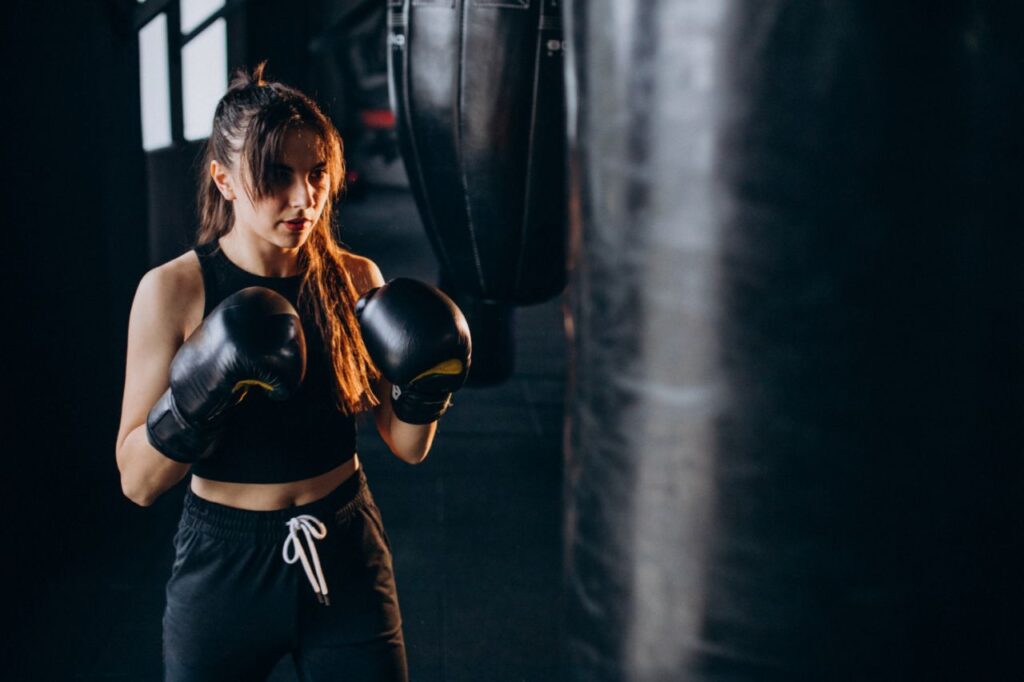This is for beginners, boxers, first-timers, and anybody who doesn’t know what he’s doing. Sparring is not about getting beat each other up or fighting for real. It’s about learning how to fight by practising fighting. It’s not a real fight, and the goal is not to win.
Boxing sparring is by far one of the greatest ways to improve your boxing, as it simulates an actual boxing bout. Depending on your skill level, one fights 2 or 3 minutes per round with 1-minute rest in between. During this, you’re free to do and throw whatever you have trained during your other training, such as the boxing pads or heavy bag.
The essence of sparring is to make you and your partner accustomed to the flow of a real fight. It’s designed to mimic specific circumstances and situations you will face either in the ring or in real life so that you know exactly what to do when the time comes to put your skills to use.
Sparring is important for becoming a competent fighter. It’s the best training method, hands-down, to improve your boxing skills. In addition, sparring regularly helps to keep your skills sharp. However, to someone new to the sport, sparring could seem very intimidating. It can be difficult for a new person to distinguish between sparring and an actual fight.
It is hands-down the best training method to improve your boxing and recommended that all boxers (not only aspiring fighters) spar regularly to keep their skills sharp. However, to a newbie, sparring can be very intimidating.
However, sparring can be very daunting, especially for beginners. It’s a nerve-wracking task to climb through those ropes and stand across an opponent for the very first time.
If you’re interested in beginning sparring, here are a few pointers to consider to help get you ready both mentally and physically for your first time in the ring.
Boxing Sparring Tips To Get You Started
As a beginner in boxing, sparring can be a little daunting. It’s something you’ve never experienced before, and there’s nothing quite like it. So naturally, you will feel a bit apprehensive at the thought of stepping into the ring and trying out what you’ve learned against a live body.
But there comes the point in your training when you reach a certain level. Your skills become sound, your technique, fluid. The more you hone your craft, the closer you get to when it’s time to climb into the ring and spar.
One of the most important aspects of training in boxing is sparring. Sparring is the closest thing to a real fight, without actually fighting. It will help you better grasp the correct use of the skill and techniques you’ve drilled in the gym and how to utilise them in terms of distance and reach timing and rhythm, and in different degrees of power.
How Do You Know You Are Ready To Start Boxing Sparring?
You should make sure you at least spend a few months learning the basics of boxing defence and proper punching before you jump into sparring. Learn how to throw that jab, learn how to start catching punches--make sure you have the technique down before you advance any further.
Many people are intimidated when sparring for the first few times, and so today, we’d like to share with you practical tips to keep in mind before and during your sparring session.
Wear proper equipment
Arguably one of the most important boxing sparring tips. Sparring is inherently dangerous, so safety must always come first. When you are getting ready for sparring, remember to have the necessary equipment.
Mouthguard, head guard, hand wraps, and (minimum) 16 Oz gloves are must-haves. Groin guard is preferable, as punches in that area will seriously hurt and cause a serious injury considering how delicate the groin is.
Remember to always have those mentioned above before sparring, and always demand your opponent to have it. Sometimes you meet people who claim they can spar without a mouth guard/head guard. In that case, tell them to spar someone else.
Remember what sort of sport boxing is. You can get injured on only one side of the coin. The other side is that you can cause serious damage to the other person—bear that in mind.
Stay at your level
This will be the biggest and most important step to learning how to fight (or learning anything, really). STAY WITHIN YOUR LEVEL. 99% of all beginner problems (getting beat up, getting tired, reverting to bad habits, opponent too strong, etc.) could have been avoided if only they stayed within their level.
It’s not possible to learn if you’re never given a comfortable environment to learn. Beginner surfers don’t go down the steepest hill, and beginner mountain climbers don’t start on Mount Everest. Likewise, beginner boxers should not be going at full power. It’s not only stupid; it’s dangerous.
At best, the only thing hard sparring can do for beginners is to make them tough, but it will not give them any skills. Instead, it’ll only make them tougher at getting beat up.
Stay relaxed.
Live sparring can get intense, and it can be nerve-racking, but you don’t want to let your nerves get the best of you. Nerves will exhaust you, so try to keep them under control.
A relaxed fighter will keep going for days, but a tense, nervous fighter will gas out quickly, even if they are in phenomenal shape.
I’ll put it this way: to relax means to…
- Do not worry – doesn’t matter if you get hit, doesn’t matter if you lose, doesn’t matter if you look terrible, doesn’t matter if you can’t land anything on your opponent, or if you get tired fast, or if you make a mistake, etc.
- Go slow – there’s no rush to jump around and land a knockout punch. You’ve got a whole 3 minutes to figure things out. Take your time, move around and get comfortable. Punch because you want to, not because you feel like you HAVE to do something. Boxing is not a race.
- Be lazy – remember those lazy days when you sat on the couch watching TV and only got up to get food or go to the bathroom? Try to have the same attitude for boxing. Every time you use energy, it’s for a meaningful purpose like punching or defending. And all other times, you’re looking to save energy and be lazy again. Learn to rest in between your explosive movements. Don’t carry tension all the time.
Remember to master your emotions.
This isn’t just limited to sparing but also applies to your core defence.
Your emotions can easily take over and hamper your judgement, control and reflexes. It’s very easy for emotions such as disappointment, anger, and frustration to flare up when being repeatedly hit. This may lead to emotional fighting, which can result in dumb moves.
This may also cause a friendly sparring match to turn into a fight if you aren’t careful. It’s imperative to feel the emotions but at the same time let go of them as well. It shouldn’t be the force driving you to do something you might regret. Never let your emotions control you.
Choose your sparring partners carefully.
Once you’ve decided to enter sparring, you’re going to want to choose your sparring partners carefully. When you’re just starting, it’s good to spar with your instructors first, as they are the most qualified to guide you through sparring basics.

But when you’re ready to choose your sparring partners, it’s important to make informed decisions. Not every sparring partner is the same.
You will want to avoid partnering with someone way ahead of your current skill level. This will be counterintuitive to your learning. You should either choose someone on the same level or just slightly ahead of you.
Sparring should also be a mere tool for you to test your techniques in real fight situations, especially for beginners. Advanced fighters are used to going all out in sparring, and that’s not the kind of sparring you want when you’re just starting.
You will want to focus on applying the techniques and strategies you’ve learned in training and not try to “win” sparring matches. You’re also not supposed to be throwing punches with a hundred per cent sparring and speed.
Try and be unpredictable.
It’s fairly easy to fight in predictable patterns when not thinking clearly. The most important thing to keep in mind is constantly thinking and moving accordingly. Many people enter an ‘auto-pilot’ mode where they either stop thinking or blank out. This results in their opponent anticipating their next hit and makes it easier to take them out. Your head must always be in the game.
Find a comfortable boxing stance.
Follow every stance rule your boxing gives you; like the elbows down, and chin tucked, and yada yada yada…but find a way to make all that feel comfortable. There is no way you will ever be able to move around, let alone fight, if you don’t feel comfortable in your boxing stance.
This is why you need to shadowbox a lot. Spend time by yourself moving around from your boxing stance and adjusting to your stance and technique. Unfortunately, too many beginners are skipping shadowboxing to spend time on the heavy bag, which distracts them by focusing on power.
Do not eat at least three hours before!
One of the more neglected boxing sparring tips. However simple this sounds, surprisingly, many people don’t follow this great advice. So we’ll say this again—do NOT eat a few hours before sparring, even if you’re starving.
Having a full stomach makes you slower and heavier, as well as it doesn’t put you in the right state to spar. The reason why people defecate under extreme stress comes from our survival instinct, which truly understands that fighting the danger or running from danger will be most effective with an empty stomach.
Also, a full stomach not only makes you perform worse.
Taking a body shot might end up being bad. We’ve seen students puke in the ring after a body shot—not only will you embarrass yourself from it, but you’ll be causing trouble to the gym staff, who’ll have to clean it up.
So do a great service to yourself and the people around you by not eating hours before sparring!
Alternate between partners
People tend to stick with the same partners as they become comfortable around each other. This is a huge mistake as, after a while, you begin to cope with each other’s techniques and become lazy. Constantly shuffling between partners shows you new techniques. It’s also good to try and spar with someone who may be better than you. If they have the right attitude, it can help with your technique.
Set the terms of intensity
In light of this, sparring partners should have a verbal agreement about how hard to go before every session.
Agreeing on a set intensity for a sparring session is important in keeping the action under control. It helps prevent things from getting heated and those sparring to lose their composure.
Before starting every round of sparring, talk with your sparring partner on how hard to go. Most fighters will agree to spar at a percentage of intensity. For example, if you agree on 50% power and speed, stick to it. You don’t want to be hitting harder than your sparring partner, and vice versa. Remember, sparring is about improving technique and strategy, not trying to knock each other out.
Don’t Look Away
The next habit you want to form is never looking away from your sparring partner during the round. It totally makes sense, and surely only an idiot would do such a thing, right? But you would be surprised how easy it is to lose focus briefly.
You’ll find yourself glancing at the round timer when you’re tired, or looking at your coach when he’s yelling instructions at you, or stopping to talk to your mate when he’s asking if you want a lift home.
All it takes is a quick lapse in concentration to finish the sparring session with a burst nose. Stay focused, and block out distractions. Shout out acknowledgments if you must, but don’t look away from your opponent.
Be mindful of your habits.
Once in the ring, be mindful of your habits. To get the most out of your sparring, your brain should be downloading all of the tactile information your body will pick up in each session.
Fights often come down to who can take advantage of certain openings. Good opponents will always try to decipher your habits and find openings to exploit. By being mindful of your habits, you can make tactical and technical adjustments on the fly. It’s a key skill in fighting.
Having complete mental awareness, calmness under pressure, and the ability to execute under duress are key skills you develop in sparring.
Furthermore, you will want to stick to your fundamentals. Pay attention to your footwork and ring generalship, defence, and punching technique. If needed, you should drill your techniques repeatedly to get them right. You can ask your sparring partner to attack or defend a certain way so that you can train for specific situations in the ring.
Remember, sparring is not fighting but a tool to help you practice your fighting techniques in real situations.
When in doubt, trade punches.
Can’t see him? Can’t keep him off you? Don’t know what to do? JUST FIGHT! It’s better than eating punches. At least you can hit him back while you eat punches. The closer he gets, the harder you throw. The farther he is, the more measured you can become. If you’re too scared to trade punches, you’re probably not fighting at your level.

The best way to throw blind punches is to aim for his chest. First, start your punches there and aim more towards his head once you know where he is.
Don’t Fear Getting Punched.
You’ll inevitably get hit. Learn not to fear it
Now this one’s a hard one for newbies. It’s human nature to avoid pain and be anxious about anything that will cause us pain.
If we see a punch coming, our natural reaction is to cringe – unless you’re a boxer, in which case you’ll naturally dodge, block, or counter. Understand that it would be safe to bet the house on getting punched in boxing.
Although it’s extremely difficult and goes against your innate reactions, don’t cower away from punches. Instead, accept that it’s going to happen – and even try to enjoy the feeling of being alive you get from being punched.
Once you’ve taken a few, you’ll realise that you’re not made of glass, and it doesn’t hurt as much as you were expecting.
Do NOT apologise
Nothing more annoying than a guy who keeps apologising.
If you want to apologise, play badminton or football, not boxing. Sometimes, you might hit someone too hard, hit him in the back of the head, or elbow him. But do keep in mind that when your opponent enters the ring to spar, he realises that things like these might happen. So, let it be and keep sparring.
The worse are the guys who stop, say sorry, and ask if everything is okay. Yes, it’s good to be nice, but you have two or three minutes in the round, and your sparring partner came here to train, not to hear you apologise.
Of course, if you hit somebody in the groin or do a serious foul, you can touch your opponent’s gloves to check on him, but don’t make apologising for a habit during your sparring sessions.
Making Positive Assessments After Boxing Sparring
The only thing worse than an opponent beating you up is you beating yourself up. I don’t get why people like to put themselves down. Don’t waste your time on negative thoughts that won’t improve your boxing performance–it’s not necessary. Focus on what you did wrong. Focus on what you did right. Improve what you can. That’s it. Any energy you spend thinking about ANYTHING ELSE is a waste of energy.
Don’t waste your time wondering if you have what it takes to be a champion. Don’t waste your time crying about why you weren’t fast enough or good enough. Don’t waste your time complaining that you didn’t feel as good this week as you did last week. That crap doesn’t matter.
Find out what you did wrong. Then, find out what you did right. Improve what you can. Try again. Repeat.
FAQs
When Should A Beginner Start Sparring In Boxing?
Many people who have trained in boxing for a few months have often wondered when they should start sparring. It’s one of the most commonly asked questions. The answer to this question varies from person to person, but generally, sparring should be introduced after about 3-4 solid months of consistent training.
Can You Learn Boxing By Sparring?
Sparring doesn’t only help you improve your physical skills, but it also helps you perfect your mental state when facing a real opponent. On the other hand, others say that sparring in boxing is unnecessary, especially when you only learn boxing for your overall health, which is quite a reasonable point.
How Do I Get In Shape For Sparring In Boxing?
Work out the muscles you would use in fighting, which is pretty much your entire body. Start running, skipping rope, squats for the legs. Bag work, speed bag, shadowboxing, push-ups for the arms. Sit-ups and crunches for the core.
How Do You Breathe When Sparring In Boxing?
When sparring, hitting the heavy bag, or shadow boxing, you still want to breathe in slowly, preferably through your nose. When you punch, let out a short, quick breath. You know those loud sounds boxers make, then they punch? That’s what they do.
Does Boxing Sparring Hurt?
Sparring hurts as much as you want it to. It’s a consensual act, so if your partner is going too hard, you tell them to tone it down, and either they do, or they don’t get to practice with you anymore. It’s good to spar hard for educational purposes, but you don’t have to get roped into something you don’t want to do.
Shadow boxing is a staple for fighters—it's also a sneaky killer cardio workout. While burning upward of 400 calories per hour, shadow boxing also helps you develop foot speed, hand coordination, and technique. And best of all, it can be done anywhere, anytime for a quick and heart-pumping fight session.
Because there is no resistance when shadowboxing, it will not get you stronger. If you want to get stronger for boxing, you need to perform basic exercises with barbells, dumbbells, kettlebells, and medicine balls.
In fact, a study published in the Journal of Sports Science and Medicine suggests that shadow boxing shows prominent results in weight reduction in obese athletes. Especially for your biceps, triceps, and shoulders – shadow boxing is a wonderful exercise for muscle gain. It will help in toning your muscles.

